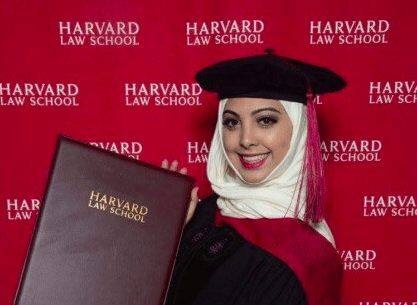
Entretien avec Fatima Al Qubaisi

Pour le 8 Mars, la journée International de la Femme, nous avons eu la chance d’interviewer une jeune femme, Fatima Al Qubaisi, première femme émirati à avoir été diplômée de Harvard Law School, et qui, entre traditions et modernité, parvient à atteindre ces rêves. Nous avons été mis en contact avec elle par le biais de notre CPE Mme Lopez que nous remercions. Cette jeune émirati à un récit passionnant, qu’elle raconte avec une prise de recul, une curiosité et un altruisme qu’elle nourrit en elle depuis toute petite, avec une volonté de voir plus grand, plus haut. Elle a toujours refusé de poser des limites à ses ambitions malgré le poids des étiquettes de la société. Son parcours est un modèle pour les jeunes filles du monde arabe. Nous pouvons toutes en tirer une belle leçon de vie. Nous vous livrons ici son témoignage tel que nous l’avons recueilli, en anglais, afin de ne rien trahir de son histoire.
Rizlane El Aaza,
Jeune Reporter
1)What inspired you to become a lawyer?
I have wanted to become a lawyer since I was a young girl. I wanted to help people, particularly women. I use my knowledge of the law and my network to empower women.
I was 12 years old when I co-found and participated in a debate club and Model United Nations. I knew then that this was something I was passionate about. We often think of Suits when we think of lawyers but it’s far from that. Instead, think more Amal Clooney, think of Michelle Obama and maybe even me.
2) Growing up, how challenging was it to deviate from the stereotypical path that emirati women had or were expected to have back then (few career ambitions, etc.)? At that time, was it hard to find a support system (friends, family, teachers..) to believe in you and encourage you to pursue your dreams?
I think we carry many labels. It’s important to realize that we are more than just our labels. For me these are Muslim, daughter, woman, Emirati, lawyer. These are things that I am but they are not the only attributes that define me. I think we are all much more complex than that.
I found my support system in my family who always encouraged me to pursue my education and my friends who were always there for when I failed. I realized early on that you will need people to rally for you and it is only with great mentors and people who believed in me that I got to where I am now. I hope to pay it forward and do the same for others.
3) I heard in an interview that your experience in the French educational system, specifically in the Sorbonne University of Abu Dhabi, was based on memorization of the laws rather than a deep understanding of those by questioning them. In what way do you think the French education system could lean towards more freedom, a value very dear to French people?
In my personal experience of attending the university in 2009, we learned the law through rote memorization. I think the law can be taught that way. There also was an expectation to agree with our professor. The thing is that I often didn’t. I had my own opinion, I disagreed with how a case was handled and I often felt that justice wasn’t served.
I hope that law students realise it’s important to not just know the law, but to deeply analyze it, and more importantly. recognize when laws need to be adapted and changed. Most importantly, when the norm is to just agree and memorize an answer, I still wrote my own opinion, I defended my arguments thoroughly and I took the road less traveled.
In the future I envisage that law students get to study subjects they are interested in and not just assigned, that we stop caring about grades and focus on learning and that we begin to innovate more in a field that so desperately needs it.
4)How was your experience in the Harvard Law School and how was it living abroad, in a western country, as a young Muslim woman filled with ambitions?
I loved being at Harvard Law School. It was an election year, therefore it was an interesting time to be in the US.
While I was there, they implemented the Muslim ban and I saw first-hand how students could not come back. It brought the community closer together. We had iftar together and we brought a calligrapher and henna artists for International Day at Harvard to familiarize people with our culture.
Harvard is what you make it. Some people were most comfortable with their nose in a book. Others enjoyed meeting people from all around the world. As for me, it involved ensuring my two best friends did NOT miss out on our graduation ball because they were studying and inviting my class of 172 classmates for either breakfast, lunch or coffee and give them a taste of authentic Emirati hospitality.
5) Have you ever experienced unfair treatment from an employer that had issues trusting you because you are a young emirati woman? If so, what advice would you like to give to young women that might be subject to that during their career?
My advice to young women is that no matter what stereotype you may face or what obstacle comes your way, things are changing rapidly. You are allowed to dream bigger than you could imagine.
There will be challenges but even those will make you grow. They will build your character. Surround yourself with kindred spirits who are there to lift you up when you fall.
6) How does your leadership style reflect the person that you are and what you stand for?
(In any organization, I have a flexible leadership approach. I like to mentor and guide those who prefer that approach. I don’t enjoy micromanaging people, I want people to learn and grow on their own, giving just guidance when needed.
True leader lead by example, they care about people professionally and personally and they understand they need to be flexible to a constantly changing environment.
7) As a young country, the UAE has drastically changed over two decades. It has given a lot more rights to women and we can see that a tremendous amount of emirati women are active professionally nowadays. How does it feel to know that you are a part of this change towards female empowerment? What do you think we, as a community, can do to further work towards gender equality?
I am eternally grateful that we have come so far in such little time. I truly believe that women in the UAE are trailblazers.
It is up to each and every one of us to now be able to enjoy these rights, the doors that have been opened and the glass ceilings that have been smashed.
8)Finally, are you happy?
I am content and happy. I have a lot of privileges and I try to use them to help other people. What gives me the biggest joy in life is helping others.